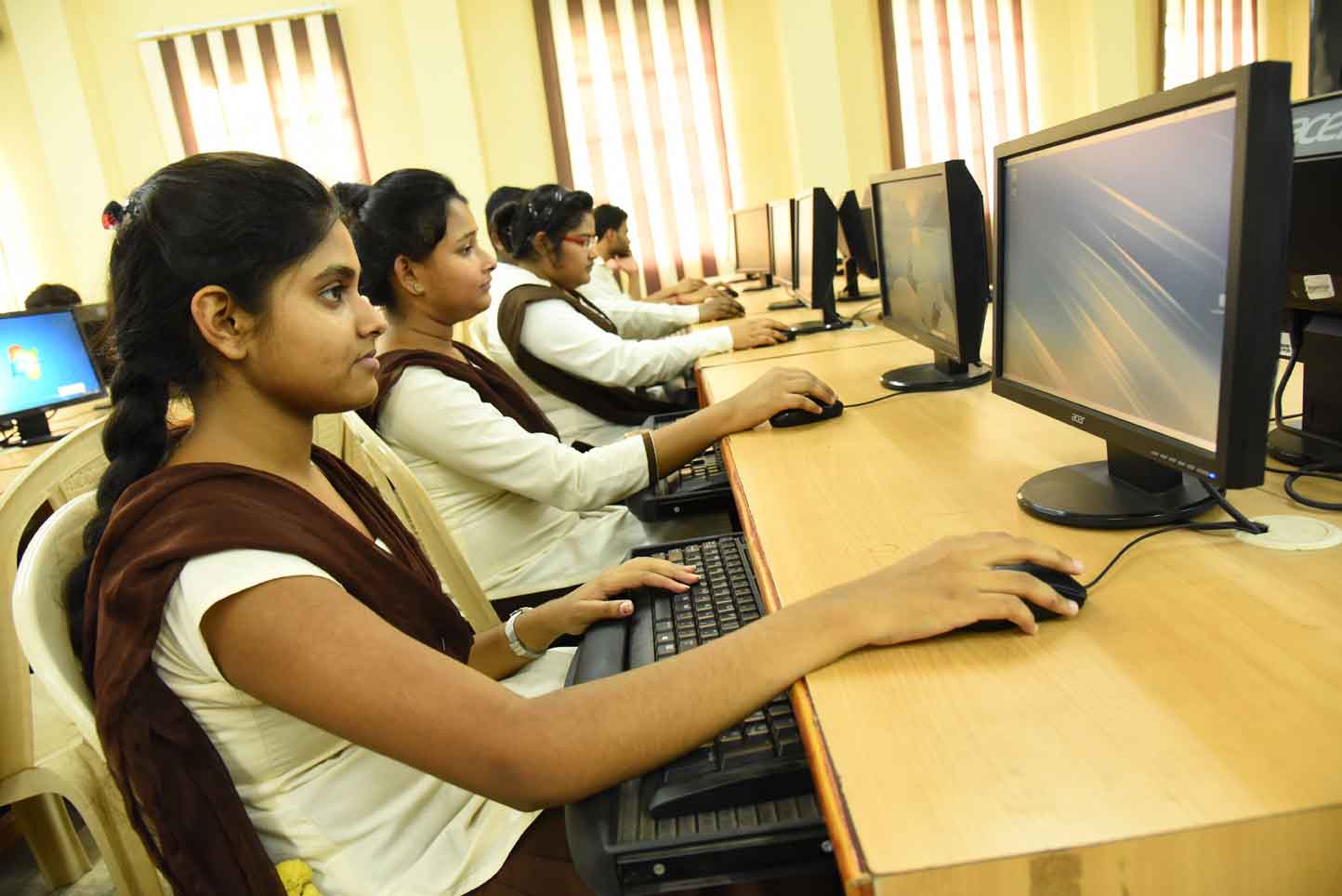
8336984278(Admission)
9064158073(Accounts)
9064329808(Student Cell)
Help line
8336984278
Help line

Electronics and Communications Engineering (Intake: 30)
About the Department:
- Electronics and Communications Engineering (ECE) Department of this college started its journey since 2002. The department is providing state of the art facilities in laboratories. All the laboratories are well equipped with modern and sophisticated instruments/equipment and software like Spectrum Analyzer, DSO, Blue tooth system, test bench etc. Department also offers original software like Tanner Tools, Mentor Graphics, MATLAB etc. There are well experienced and highly qualified List of Faculty Members in the department. Faculty members pay attention to each individual student for their progress and arrange special classes and tutorial sessions frequently beyond the scheduled academic classes. Faculty Members always encourage students for higher studies, paper publications, seminar & conference participation etc.
- The students of ECE are well placed in various MNC every year like TCS, Oracle, Ericsson, Wipro, Hexaware, Mind fire solutions, Siemens etc. Some students have qualified in GATE, CAT, MAT, GRE etc. for higher studies.
Vision of the Department:
- To excel in the field of Electronics and Communications Engineering and related areas by producing good, high quality, creative, productive and self-motivated engineers with sense of professional ethics and survive for betterment of mankind and society.
Mission of the Department:
- M1: To impart high quality education and provide best experts, infrastructure and environment to the students of Electronics and Communications Engineering for enrichment of scientific knowledge.
- M2: To adopt the best pedagogical methods in teaching-learning process to improve the understanding of theoretical knowledge in practical scenario and for making them industry ready.
- M3: To provide high degree of social consciousness, professional ethics and sense of human values, thereby enabling them to face real-world challenges with confidence.
Program Outcomes [POs]:
- PO1. Engineering Knowledge: Application of the knowledge of mathematics, science, engineering fundamentals, and an engineering specialization to the solution of complex engineering problems
- PO2. Problem
Analysis: Identification and formulation of research literature and analysis of
complex engineering problems to reach substantiated conclusions using first
principles of mathematics, natural
sciences, and engineering sciences
- PO3. Design/development
of Solutions: Design of solutions for complex engineering problems and design
system components or processes that meet the specified needs with appropriate
consideration for the public health and safety, and the cultural, societal, and
environmental considerations
- PO4. Conducting
Investigations of Complex Problems: Use of research-based knowledge and
research methods including design of experiments, analysis and interpretation
of data, and synthesis of the information to provide valid conclusions
- PO5. Modern
Tool usage: Creation, selection and application of appropriate techniques,
resources and modern engineering and IT tools including prediction and modeling
to complex engineering activities with an understanding of the limitations
- PO6. The
Engineer and Society: Application of reasoning, informed by the contextual
knowledge to assess societal, health, safety, legal and cultural issues and the
consequent responsibilities relevant to the professional engineering practice
- PO7. Environment
and Sustainability: Understanding the impact of the professional
engineering solutions in social and
environmental context and demonstration of knowledge and need for sustainable
development
- PO8. Ethics:
Application of ethical principles and commitment to professional ethics and
responsibilities and norms of the engineering practice.
- PO9. Individual
and Team Work: Functioning effectively as an individual, and as a member or
leader in diverse teams, and in multidisciplinary settings.
- PO10. Communication:
Communicating effectively on complex engineering activities with the
engineering community and with society at large, such as, being able to
comprehend and write effective reports, design, documentation, make effective
presentations and give and receive clear instructions.
- PO11. Project
Management and Finance: Demonstrating knowledge and understanding engineering
and management principles and applying these to one’s own work as a member and
leader in a team to manage projects in multidisciplinary environments.
- PO12. Life-long Learning: Recognizing the need for and have the preparation and ability to engage in independent and life-long learning in the broadest context of technological change.
Program Educational Objectives [PEOs]:
The Program Educational Objectives of Electronics and Communications Engineering students are:
PEO 1: To identify, analyze and apply the knowledge gained in applied sciences in solving problems related to Electronics and Communications Engineering and related areas and to develop and implement Analog and Digital Electronic Circuits with given specifications for modern Communication Systems.
PEO 2: To use modern engineering techniques and inculcating the practice of team work to achieve project goals by effectively interacting and displaying leadership skills and professional ethics.
PEO 3: To be creative, passionate and thrive for excellence in Electronics and Communications Engineering and related fields.
PEO 4: To engage in lifelong self-learning, career development and respond to changing professional needs in Core Industrial Sectors, IT Sectors as well as in Academia and Research.
Program Specific Outcomes [PSOs]:
The Program Specific Outcomes of Electronics and Communications Engineering students are:
PSO1: The capacity to apply fundamental knowledge of core Electronics and Communications Engineering courses in design, analysis and development of different areas of Integrated Electronic Circuits and Systems.
PSO2: Develop sufficient skills in RF & Microwave Engineering, Automation using Internet of Things (IoT), EDA and VLSI, Optimization Techniques and emerging technologies with modern tools for solving real world problems.
PSO3: Achieve the ability to adapt challenging work environment, excellent communication skills as a leader in a team work or individually with a strong sense of professional ethics, moral values and social responsibilities.
Head of The Department:
| Name: Mr. Kausik Chakraborty | |
| Qualification: | M.Tech. |
| Email: | hodece@mitbishnupur.ac.in |
| Designation: | Head of the Department (HOD) |